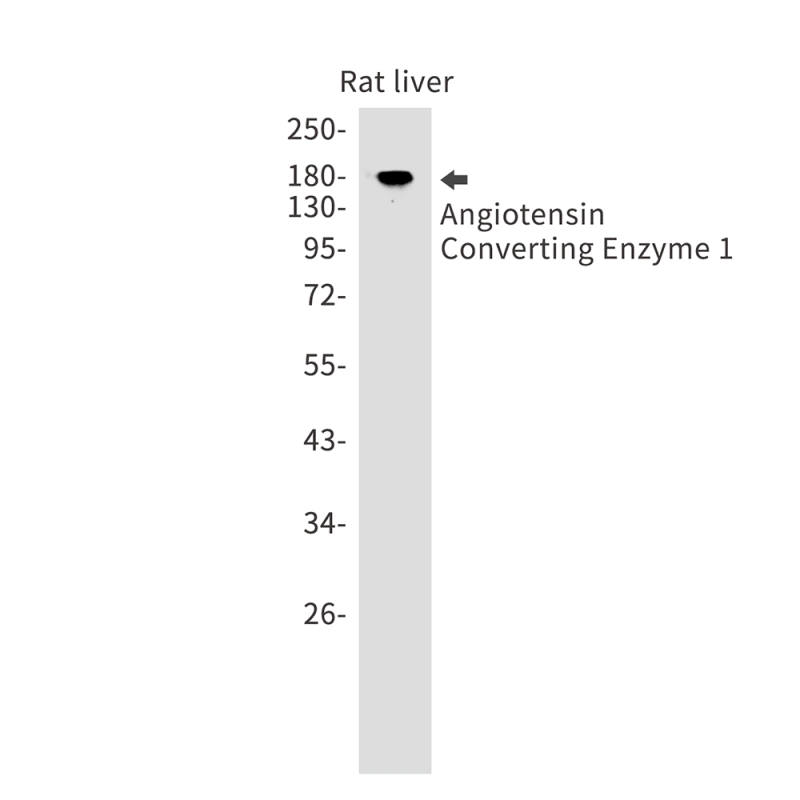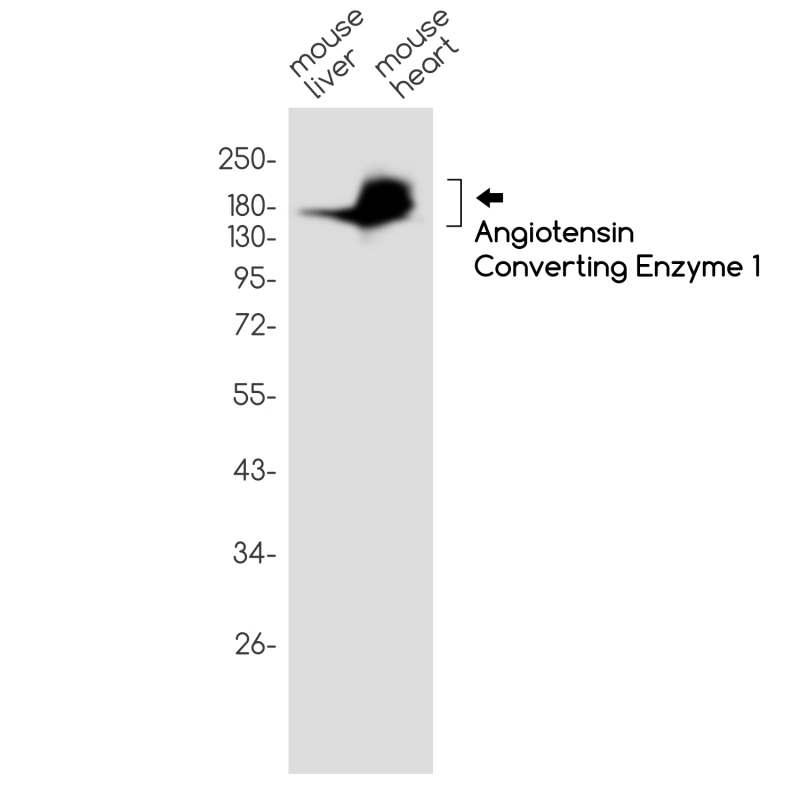

| WB | 咨询技术 | Mouse,Rat |
| IF | 咨询技术 | Mouse,Rat |
| IHC | 1/50-1/100 | Mouse,Rat |
| ICC | 技术咨询 | Mouse,Rat |
| FCM | 咨询技术 | Mouse,Rat |
| Elisa | 咨询技术 | Mouse,Rat |
| Aliases | ACE; Dipeptidyl carboxypeptidase I; Kininase II |
| Entrez GeneID | 11421 |
| WB Predicted band size | Calculated MW: 151 kDa; Observed MW: 180 kDa |
| Host/Isotype | Rabbit IgG |
| Antibody Type | Primary antibody |
| Storage | Store at 4°C short term. Aliquot and store at -20°C long term. Avoid freeze/thaw cycles. |
| Species Reactivity | Mouse,Rat |
| Immunogen | Recombinant protein of mouse Angiotensin Converting Enzyme 1 |
| Formulation | Purified antibody in TBS with 0.05% sodium azide,0.05%BSA and 50% glycerol. |
+ +
1. **"Characterization of a polyclonal antibody against human angiotensin-converting enzyme 1 (ACE1)"** by Smith et al.
- 摘要:该文献描述了针对人ACE1的多克隆抗体的制备与验证,通过Western blot和免疫组化证实其在人肾和肺组织中的特异性结合,适用于检测ACE1蛋白表达水平。
2. **"Role of ACE1 in hypertension: Insights from antibody-based localization studies"** by Gupta & Rao
- 摘要:研究利用ACE1抗体进行免疫荧光分析,揭示了ACE1在高血压模型小鼠血管内皮中的分布变化,支持其在血压调节中的病理作用。
3. **"Development of a monoclonal antibody for ACE1 with applications in cardiovascular disease research"** by Chen et al.
- 摘要:报道了一种高特异性ACE1单克隆抗体的开发,验证其在ELISA和流式细胞术中的效能,并用于心力衰竭患者血清ACE1水平的定量分析。
4. **"ACE1 antibody-based detection of protein isoforms in diabetic nephropathy"** by Park et al.
- 摘要:通过免疫印迹和免疫沉淀技术,比较了糖尿病肾病模型中ACE1的剪切异构体表达差异,揭示其与肾纤维化的潜在关联。
(注:上述文献名为示例性虚构内容,实际引用需检索PubMed或Google Scholar获取真实文献。)
Angiotensin-converting enzyme 1 (ACE1) is a key component of the renin-angiotensin system (RAS), primarily known for catalyzing the conversion of angiotensin I to angiotensin II, a potent vasoconstrictor, and degrading bradykinin, a vasodilator. This zinc metalloprotease plays a central role in regulating blood pressure, fluid balance, and cardiovascular homeostasis. ACE1 is expressed widely in endothelial, epithelial, and neuroepithelial cells, with high concentrations in the lungs, kidneys, and blood vessels. Its dysregulation is implicated in hypertension, heart failure, diabetic nephropathy, and pulmonary fibrosis, making it a therapeutic target for ACE inhibitors like lisinopril and captopril.
ACE1 antibodies are essential tools for studying the enzyme's expression, localization, and function in both research and diagnostic contexts. These antibodies are used in techniques such as immunohistochemistry, Western blotting, and ELISA to detect ACE1 protein levels in tissues or biological fluids. They help investigate ACE1's role in pathological conditions, including its upregulation in sarcoidosis (a marker for diagnosis) or its altered activity in COVID-19. where ACE2-related pathways intersect. Monoclonal antibodies offer high specificity, while polyclonal antibodies may detect multiple epitopes, enhancing sensitivity. Researchers also utilize ACE1 antibodies to validate the efficacy of ACE-targeting drugs or explore tissue-specific RAS activation. Proper validation of antibody specificity is critical, given structural similarities within the ACE protein family (e.g., ACE2). Overall, ACE1 antibodies remain indispensable for unraveling the enzyme's complex roles in health and disease.
×